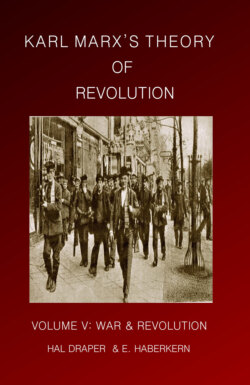Читать книгу Karl Marx’s Theory of Revolution Vol V - Hal Draper - Страница 12
На сайте Литреса книга снята с продажи.
6. What Engels Did and Didn’t Say
ОглавлениеFinally, however valuable the schemas put forward by Lenin might be in themselves, they were unknown to Marx and Engels. The following chapters will show them evolving from belligerent champions of war against Russia by ‘the Democracy’ in 1848 to prophets denouncing the war preparations of capitalist governments by 1870. Engels, by the 1880s, clearly dreaded the prospect of war. It is also true that the Franco-Prussian war was a political watershed for them.
In his last years, Engels developed the consistent antiwar politics that were the source of the resolutions of the Second International. It was his influence that guaranteed a hearing for the antiwar left even as the leadership moved to right. Most importantly, it was Engels who explicitly rejected anti-Tsarism as the basis of a revolutionary socialist position in the impending world war. But he never explicitly reexamined the theoretical basis of the politics he and Marx had held since the 1840s.
Engels continued to write on numerous occasions as if the main threat to the working class and even “European civilization” came from Tsarism.* Even in these instances, however, he explicitly repudiated any support to the governments—especially the Prussian government—opposed to Tsarism. At the same time, moreover, sometimes in the same article or letter, he recognized how weak Tsarist Russia had become. He recognized that it was the junior partner in its dealings with Germany and France. He wrote with eager anticipation of the anti-Tsarist revolution that he believed imminent. On a number of occasions, again in juxtaposition with passages repeating the old “line” about the Tsarist threat, he offhandedly describes imperialist drives leading to war that emanated from capitalist competition not dynastic ambition.**
Perhaps, Engels, by the 1890s, should have realized more clearly what was going on. Perhaps, he should have anticipated Lenin and written Imperialism, The Highest Stage of Capitalism. But he didn’t. What he did do was to imprint on the newly born Second International his own passionately held conviction that there was only one way to respond to the drive to war. Socialists had to make clear not only that they would not support any of the governments in a crisis but that they would use such a crisis to overthrow those governments.
* For an interesting treatment of the continuing debates over this question by Balkan socialists see the anthology of translated material The Balkan Socialist Tradition by Andreja Živkovič and Dragan Plavšič.
** There is one, and only one, exception to this. It is discussed in Chapter 6. In a private letter to August Bebel, Engels flirted with the possibility of supporting the German government in a real case of defense of the country. The complicated story behind this letter is discussed in some detail in Chapter 6, but the dénoument can be simply stated here. In the article he published on the question Engels explicitly rejected support for any of the governments.
